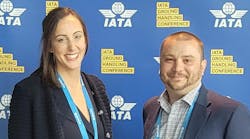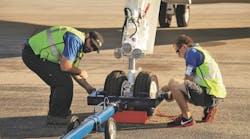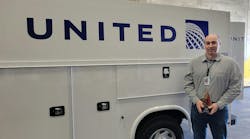Beverley Bass was eating lunch, 35,000 feet above the North Atlantic, when she heard. Chuck Schalk had just turned on his television at his Long Island home, not far from Kennedy International Airport. Steve Balogh was riding with his wife after dropping off a car at a north Texas dealer.
They, like almost every other American Airlines employee at the time, remember exactly where they were and what they were doing when they learned about the hijackings of four U.S. jetliners on Sept. 11, 2001. Two American flights were among them: Flight 11, from Boston to Los Angeles, crashed into the north tower of the World Trade Center in New York at 8:46 a.m. Flight 77, from Washington Dulles to Los Angeles, crashed into the Pentagon at 9:37.
The events of that day sent them on a 10-year odyssey -- first, their efforts to deal with the horrific events themselves and then the long struggle as American Airlines employees in the years since.
Bass, 59, the first female captain in American's history, said that in the immediate aftermath she didn't foresee how the attacks would lead to massive cutbacks and changes in the airline industry in general and at American in particular.
"I don't think anybody could have seen that," the Argyle, Texas, resident said. "I don't think anybody knew how horrible it was getting ready to be."
But Gary Moffitt, a technical specialist at American's maintenance base at Alliance Airport in Fort Worth, Texas, said he realized almost immediately -- as the United States grounded all airplanes for several days -- that the impact of 9/11 would be long- lasting.
"I think we all knew that things would be way, way different when we woke up the next day, and every day after that," Moffitt said. "We didn't know what was going to be different, but we knew it was going to be different. We knew nothing was going to be the same. There was no doubt about that."
On Sept. 11, 2001, Bass was the captain on American's daily flight from Paris to Dallas/Fort Worth International Airport. Listening on a radio frequency used by airlines over the ocean, she heard a pilot in another airplane say a plane had hit the World Trade Center.
"We really didn't think that much of it. We just figured it was a light airplane," she remembered.
But soon afterward, they heard that a second airplane had hit the World Trade Center. Someone said it was an American Boeing 737.
"It was right after that that someone mentioned the word terrorist," Bass said. "That's the first time we heard about it."
Schalk, a mechanic who works at Kennedy, was off duty that day. He watched television all day in "disbelief, shock and a lot of remorse for these people in the planes."
When his sons, then 10, 8 and 5 years old, got home from school, he sat them down in front of the TV.
"I said, 'Boys, there are days to remember, like the day when Kennedy got shot. I want you to remember this day because this day is going to change history. ... I don't know what's going to come out of this. But this is something that will be etched in your minds forever.' "
Phil Beall, a D/FW-based pilot, was working on his computer at his home when his wife, Kathy, told him a small airplane had hit a World Trade Center tower. An airplane hitting a big building when the skies are blue and clear? It didn't add up. He began watching on TV.
"About that time, whammo, I see a second airliner flying into the building. I jumped up and said, 'Kathy, we're at war.' "
Carmen Villani, an American pilot based in Washington, D.C., started getting a string of calls from friends and family almost immediately. They knew he regularly flew Flight 77, the flight from Dulles to Los Angeles that had been hijacked. That day, Chic Burlingame was the captain.
"It was a tough day for me because by the grace of God, it wasn't me. You go through that emotion and say, 'Well, why wasn't it me? Why was it Chic instead of me?' It was kind of tough to deal with," Villani said.
However, "I tell you, in that darkest hour, I saw some of American's finest moments," he said.
American began furloughing employees within a month of the hijackings, and it is now only a fraction of its former size.
From 113,610 full-time-equivalent employees in August 2001, American shrank to 97,378 by year's end. A massive restructuring in 2003 led to more shrinkage; by theof that year, the workforce had fallen to fewer than 80,000.
The numbers have shown a continuous decline since then. As of June 30, American employed 66,479 people, according to government data.
Despite two years of profit in 2006 and 2007, parent company AMR Corp. has lost $12.4 billion since the beginning of 2001. Wall Street analysts expect it to lose $1.2 billion this year.
The events of that day also changed the way employees approached their jobs, particularly the crews that manned the cockpits or served the passengers.
"Mechanically, it didn't change one bit. We fly airplanes," said Balogh, 65, who retired six years ago.
However, "we were aware now of things that we really didn't have to worry about before. Everybody was a suspect. You had questions about everyone and what their motives were and why they were on the airplane," Balogh said.
Barbara McMurrey, 62, who retired in 2008 after 35 years as a flight attendant, found that her approach to her job changed after the terrorist attacks.
"I don't think fear is the right word. I was so angry. It was like someone breaks in your house, takes everything in it and smashes it," said McMurrey, a Valley View, Texas, resident.
"The anger subsided, but I became harder in my attitude toward others. I didn't like that. I became more cynical," she said.
Copyright 2011 THE DALLAS MORNING NEWS All rights reserved. This material may not be published, broadcast, rewritten or redistributed.
This article was published on page B6 of the Wednesday, September 14, 2011 edition of The Columbia Daily Tribune. Click here to Subscribe.





